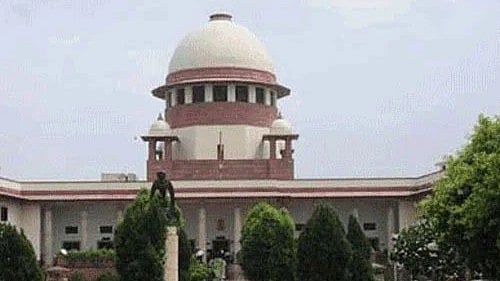
The Supreme Court of India.
Credit: PTI Photo
New Delhi: The Supreme Court on Wednesday acquitted a man, who faced death sentence for killing his wife, her sister and two children in 2013, as it found major contradictions in the testimonies of key prosecution witnesses accompanied by glaring investigative defects.
A bench of Justices Vikram Nath, Sanjay Karol and Sandeep pointed out that when a case becomes sensational, investigating agencies face enormous pressure to quickly identify a culprit and in such high-profile cases, the judiciary's eagerness to deliver justice for a heinous crime can sometimes result in handing a death sentence without sufficient evidence.
The bench set aside the Punjab and Haryana High Court order which confirmed the death penalty of the accused, Baljinder Kumar alias Kala and ordered his forthwith release after he has undergone 11 years of incarceration since his arrest on January 30, 2014.
It was allegedly the appellant killed his wife, Seema Rani aged 26 years, her sister Reena Rani aged 28 years, his daughter Sumani Kumari aged 3-4 years and his son Harsh aged 1.5-2 years, injured Harry aged 5 years, son of Seema Rani from her first marriage and Om Prakash, aged 18 years, the wife's brother.
The court said one can fairly imagine the amplitude of havoc that would wreak loose in a quiet village which on one fine morning wakes up to the news of four members of a family dead, including two lives yet to even reach the age of five years, and with two other family members grievously injured.
"It is but natural that the case garners enough sensation in no time to become a headline in the local papers and the pressure on the investigating agencies is enormous to find the culprit. The breakdown of the legal system becomes apparent when such haste to lay a finger of blame on somebody leads to a shoddy investigation and a poorly conducted trial," the bench said.
The bench further said the result is a loosely-tied prosecution case with glaring loopholes all across and yet the courts' enthusiasm to deliver justice in such a heinous crime ensures that the accused person ends up on the death row, albeit without sufficient evidence. "This is precisely the misery which the instant case entails," it said.
Setting the appellant free, the bench said when at stake are human lives and the cost is blood, the matter needs to be dealt with utmost sincerity.
The bench stressed on "major contradictions" in the testimonies of key prosecution witnesses in the case.
The court pointed out it couldn't be said the prosecution had proved its case beyond reasonable doubt.
"In the present matter, where there are major contradictions in the testimonies of key prosecution witnesses accompanied by glaring investigative defects, it cannot be said that the prosecution has established the charge beyond reasonable doubt. At the cost of repetition, we must state that the standard of proof is an absolutely strict one and cannot be faltered with," the bench said.
The bench found different versions of the same set of events being narrated by the witnesses at different points in time aside from retractions according to their convenience.
The appellant was accused of committing the murders on November 29, 2013 after visiting the house of his mother-in-law.
According to the prosecution, days before the murders, he had threatened to kill his wife and children who had left him over a monetary dispute. An amount of Rs 35,000 was to be paid to Baljinder and his sister by her former husband as part of their divorce settlement.
Since his mother-in-law stood as guarantor for his sister's husband for returning the amount, and when such amount was not paid, it led to constant fights between Baljinder and his wife, and ultimately the murders, it claimed.
